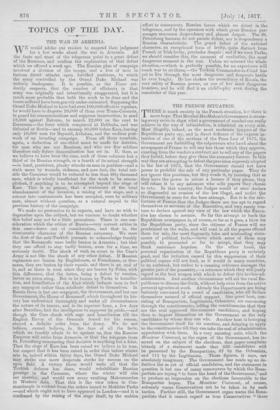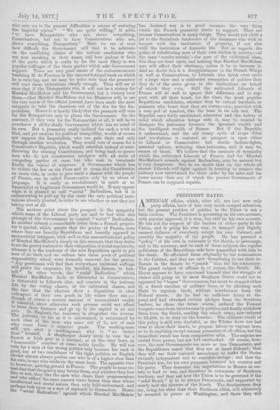THE FRENCH SITUATION.
THERE is much anxiety in the French situation, but there is more hope. That Marshal MacMahon's Government is strain- ing every nerve to alspw what a government of combat can really achieve in the way of intimidation, is admitted on every side. Most illegally, indeed, as the most moderate lawyers of the Republican party say, and in direct defiance of the express in- tention of one of the sections of the Press Law of 1875, the Government are forbidding the eolporteurs who hawk about the newspapers of France to sell any but those which they approve, exacting from the vendors a contract not to sell any of the papers. they forbid, before they give them the necessary licence. In this way they are attempting to defeat the provision expressly adopted in the law of 1875, that the Government should not have power to prohibit the sale of any particular paper. They do not ignore this provision, but they evade it, by insisting that as they have the power to refuse a licence if they please, they will refuse it to any salesman who sells papers they choose to veto, In this country,' the Judges would at once declare so disgraceful an evasion of the law illegal, and mulct the Government in costs for the base attempt. But it is the Mis- fortune of Prance that the Judges there are too apt to regard themselves as servants of the Executive, and very rarely ven- ture to declare against any view of the law which the Execu- tive has chosen to assume. So far this attempt to burk the Republican newspapers is, of course, so far as it goes, a blow for the Republican party, since the citizens of France will see proclaimed on the walls, and will read in all the papers offered them for sale, the most flagrantly false and misleading state- ments of political facts,—views which some of them may possibly be persuaded so far to accept, that they may think resistance hopeless. On the other hand, the personal organisation of the Republican party is certainly good, and the irritation caused by this suppression of their political organs will not lead, as it would in many countries, to an outbreak, but rather to a cunning reticence amongst the greater part of the peasantry,—a reticence which they will justly regard as the best weapon with which to defeat this lawless ad- ministration. And another circumstance will aid the rural Re- publicans to discern the truth, without help even from the active personal agencies at work. Already the Departments are being furiously canvassed by a crowd of candidates, who all declare themselves assured of official support. One great host, con- sisting of Bonapartists, Legitimists, Orleanists, are canvassing through the constituencies, telling the constituencies that they are the real approved Government candidates, and hoping thus to impose themselves on the Government as the only candidates by whom they can win. Another host is besieging the Government itself for its sanction, and delaying to apply to the constituencies till they can take the seal of administrative approbation with them, In a very amusing note, which the 11foniteur Universei, as the organ of the Government, has in- serted on the subject of the elections, that paper complains bitterly of a statement made that 382 candidates will be presented by the Bonapartists, 87 by the Orleanists, and 111 by the Legitimists. These figures, it says, are absolutely imaginary. The Government has made up no de- finitive list as yet of official candidates, and the statement in question is but one of many manceuvres by which the Bona- partists are trying "to force the hand of the Government," and to produce an impression on the elections favourable to the Bonapartist hopes. The Moniteur Universel, of course, solemnly warns Conservatives not to be taken in by such tactics. Further still, the Government organ warns the Bona- partists that it cannot regard as true Conservatives " those, who only see in the present difficulties a means of restoring the imperial re'givie. " We are quite willing," it adds, "to have Bonapartists who are, above everything, Conservatives, but not to have Conservatives who are, above everything, Bonapartists." Here we see at once how difficult the Government will find it to arbitrate on the conflicting claims of the various candidates who are now speaking in their name, and how jealous it feels of the party which is really by far the most likely to win popular suffrages of the three parties which asks Government support. These are very good omens of the embarrassments besetting M. de Fourtou in the unconstitutional work on which he is entering, and we may be quite sure that the peasantry will read these indications clearly enough. They will see at once that if the Bonapartists win, it will not be a victory for Marshal MacMahon and his Government, but a victory over them,—that Marshal MacMahon and his Ministers will, to use the very words of the official journal, have been made the mere catspaws to take the chestnuts out of the fire for the Im- perialists. Hence it is hardly likely that the peasants will vote for the Bonapartists only to please the Government. On the contrary, if they vote for the Bonapartists at all, it will be to overthrow a shilly-shally Government which has no mind of its own. But a peasantry really inclined for such a work as that, and yet anxious for political tranquillity, would of course not support the Imperialists, who can gain their end only through another revolution. They would vote of course for a Conservative Republic, which would establish instead of over- throwing the existing Constitution, and bring back to power men who do not countenance intrigues with all sorts of competing parties at once, but who wish to terminate finally the re'gime of suspense. A Government which has to violate the law on the Press and to strain the Constitution on every side, in order to give itself a chance with the people of France, can be called Conservative only by an abuse of language. It is really as revolutionary in spirit as an Imperialist or Legitimist Government would be. It may oppose what it is pleased to call " social " Radicalism, but it is en.cleavonring to pull up by the roots the only political insti- tutions already planted, in order to see whether or not they arc taking root at all.
The anxious point about the prospect is the sympathy which some of the Liberal party are said to feel with this attempt of the Government to combat "social" Radicalism. In another column a remarkable letter from a French proprie- tor is quoted, which asserts that the gentry of France, even where they are heartily Republican and heartily opposed to monarchical intrigues, wish well to this unconstitutional policy of Marshal MacMahon's, simply on this account, that they desire to see the gentry restored to their old position of social superiority, whereas it is the tendency of the new Republican spirit to put men of no birth and no culture into those posts of political responsibility which were formerly reserved for the gentry. "Any gentleman will find that everywhere universal suffrage will prefer his carpenter, his butcher, his farmer, to him- self." In other words, the " social Radicalism" which Marshal MacMahon finds so distasteful to Conservatives, is distasteful to Liberals also, and consists in the jealousy felt by the voting classes, of the cultivated classes, and the fact that the electors show a disposition to elect colleagues of their own grade in life where they can •— though of course a certain amount of accumulated wealth is essential, since otherwise such persons could not afford t leave their business and go up to the capital to sit and vote. In England, the tendency is altogether the reverse. The jealousy, so far as it is entertained, is entertained by each class of the men who come out of it, not of men who come from a superior grade. The working-man will not elect a working-man who is "no better than" himself. A shopkeeper dearly loves to vote for a Scotch or Irish peer or a no , or at . the very least, an "honourable" member of some noble family. He will not vote for a man of the wrong politics only because his rank is p good, but of two candidates of the right olitics an English elector almost always prefers one who is ofa higher class than his own, to one who ranks on the same level. The opposite view is, however, gaining ground in France. The people to some ex- tent fear that the gentry may betray them, and whether they fear this or not they like the men who share their prepossessions and who reflect the same narrow views better than men whose intellectual and moral nature they only half-understand, and perhaps look upon as a sort of reproach to themselves. Hence the "social Radicalism" against which Marshal MacMahon has declared war is in great measure the very thing which the French peasantry desire to support. They are intense Conservatives in many things. They would not yield a jot to the Socialistic tendeneies of the dreamers who wish to tamper with the institution of property, if not also with the institution of domestic life. But as regards the policy of substituting men of their own station in society,—of the same couch° sociale,'—for men of the cultivated class, this they are bent upon, and nothing that Marshal MacMahon says will affect their obstinacy, unless it be to increase it. And no doubt this is a disappointment to the French Whigs as well as Conservatives, to Liberals who think even more of a large view and a cultivated conception of politics than they do of the name given to the institutions on behalf of which they vote. Still the cultivated Liberals of France will do well to ignore this difference and to sup- port, with all their heart, for the time, the most popular Republican candidates, whether they be retired butchers, or peasants who boast that they are cossus,—i.e., provided with a cosy pod of comfort, like the bean in its soft bed. The Republic once fairly established, education and the habits of mind which education brings with it, may be trusted to dissipate the jealousies between the ignorant wealth and the intelligent wealth of France. But if the Republic is undermined, and the old weary cycle of coups d'e'tat and revolutions is restored, no prospect is open either to Liberal or Conservative but sterile faction-fights, arrested culture, widening class-jealousies, and it may be, scenes of blood. We believe that the measure of sympathy which the cultivated Liberals of France feel for Marshal MacMahon's crusade against Radicalism, may be natural but is very dangerous. Nor do we doubt that on the whole all sincere Liberals will fight against it, trusting to remove the jealousy now entertained for their order by far safer and far juster means than any of which the present Government of France can be supposed capable.



































 Previous page
Previous page